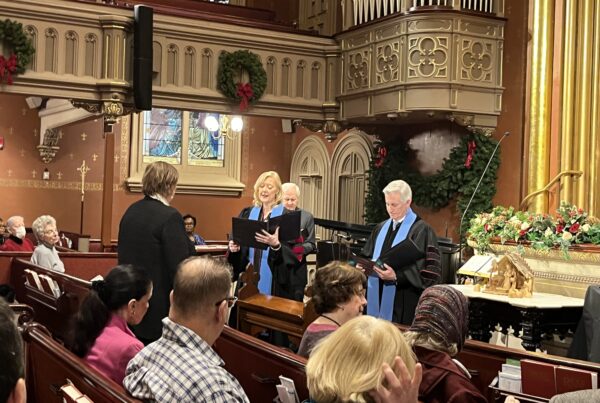T he Holy Spirit is an advocate, present to help us discover our place in God’s unfolding narrative. But it can be challenging to identify the work of the Holy Spirit or to confidently know that we are indeed hearing the Holy Spirit’s voice.
Our understanding of God flows from a lifelong reliance on the Father, Son, and Holy Spirit. To identify the movement of the Holy Spirit while acknowledging the Spirit’s relationship within the Trinity is both a gift and a grace. “But the Advocate, the Holy Spirit, whom the Father will send in my name, will teach you everything and remind you of all that I have said to you,” said Jesus (John 14:16).
Events from the lives of Moses, Elijah, and Mary, recorded in the Bible, offer insights into this spiritual reality and offer postures that may help us tune into the work of the Holy Spirit.
Moses: The Prayer of Relinquishment
Standing barefoot before a burning bush, Moses learned from the angel of the Lord the name of God who was sending him back to Egypt (Exodus 3). God used this commissioning moment to remind Moses of God’s powerful presence and to inform Moses of his responsibility to lead the Israelites into the Promised Land. What preceded Moses’s encounter with God was his time in the Midian desert, tending his father-in-law’s flock, listening to the groans and longings within his soul, and relinquishing his old Egyptian pretentious ways. In order to accept his call to lead the Israelites into freedom, Moses had to relinquish both his past and his present to move forward into the future with God’s leading.
St. Augustine said, “Usually prayer is a question of groaning rather than speaking, tears rather than words.” In a prayer of relinquishment, unexpected emotions surface, masks are removed, and control of one’s own life is no longer desired. When our longings and desires become aligned with God’s, we are able to identify the work of the Holy Spirit and thus are empowered to follow the leading and guiding of the Holy Spirit.
Elijah: The Practice of Slowing
Standing before the Lord on Mount Horeb, Elijah encountered forces of nature—a strong wind, an earthquake, and fire. But as he rested in God’s presence, he noticed that the Lord was not in any of these elements. However, the Lord was in the sheer silence that followed. In the absence of loudness, Elijah heard God speaking. Like the sheer silence that drew Elijah from his hiding place, so the Holy Spirit draws us into God’s presence.
At the entrance of the cave, Elijah heard God’s inquiry: “What are you doing here?” (1 Kings 19:13b). Elijah was resting. He slowed down and stopped running from his enemies in order to listen attentively for God’s voice. And, like Moses, in his commissioning moment, Elijah learned what God was doing and how he was to respond. As he returned to the wilderness of Damascus, Elijah was undoubtedly reminded of God’s presence as he anointed kings and faced the humbling reality that Elisha would take his place as prophet.
The spiritual practice of slowing equips us to face our realities with humility and courageous hope. In the Spiritual Disciplines Handbook, Adele Ahlberg Calhoun points out the obvious: we don’t get to our futures any faster if we hurry.1 Elijah could not hurry his way through God’s plan; rather, he had to follow God’s leading. In the absence of hurry, we, too, might hear the Holy Spirit’s whisper. With the regular practice of slowing down, tuning into the work of the Holy Spirit becomes second nature, and a better version of self becomes evident to all.
Mary: The Posture of Simplicity and Acceptance
A very young Mary learned that she was “one who has found favor with God” from Gabriel, an angel sent by God, who stood before her and announced that Mary would be the mother of Jesus, the Son of God. In humble contrast, Mary described herself as “the servant of the Lord” (Luke 1:38). Yet, regardless of how Mary saw herself, according to God’s Word, the Holy Spirit “came upon her and the power of the Most High over shadowed her.” Her pregnancy—and her role as Christ’s mother—was a reminder of God’s favor toward her. In time, Mary learned to accept God’s favor: “For he has looked with favor on the lowly state of his servant. Surely from now on all generations will call me blessed” (Luke 1:48).
What caused the Lord to do such great things for this favored servant? Likely there was a simplicity to Mary’s life with God that set her apart from her peers, as well as a posture of acceptance toward God’s will. In Celebration of Discipline, Richard Foster describes the practice of simplicity as an outward life that reflects an inward reality.2 Was God’s favor a result of the inward reality of Mary’s life? Was Mary more concerned with her soul “magnifying the Lord” and her spirit “rejoicing in God” than following legalistic religious leaders and being accepted by her community? Probably. And Mary simply accepted God’s plan for her life, even when receiving a surprise revelation that came during a startling encounter with Gabriel.
A simple, spiritual life is a balanced life in which joy and freedom are manifest. I believe that Mary, with all her being, sought the Holy Spirit’s guidance long before her unique encounter and pregnancy. And I believe that if we embrace a posture of simplicity and acceptance of God’s will, like Mary, we can hear the Holy Spirit speaking and guiding us.
You and I: Listening to the Spirit’s Stirrings
Has the Holy Spirit ever gotten your attention in an extraordinary manner or after a time of extended prayer and stillness? When have you slowed down long enough to hear the Holy Spirit inquire about your life? What stirrings within nature have caused you to solely seek the Holy Spirit’s guidance? When has the Holy Spirit reminded you of God’s favor in your life?
“When we have learned through experience to recognize the voice of God as it enters into the texture of our souls, the lives of biblical characters become real to us, and the life of God in them becomes something with which we can identify. Our faith is strengthened by this, and we are able to claim our part in the unified reign of God in his people throughout history on earth and in heaven.” –Dallas Willard, Hearing God3
Treetop leaves stirring in the new morning wind encourage me to pay attention to the work of the Holy Spirit throughout my day, most often through little stirrings. When I’m sweeping leaves off the path to my home in California or shoveling snow off the front porch in Wyoming, I am often reminded of the first moment I encountered Christ—when I felt the light of God’s love and was welcomed into fellowship with the Holy Spirit. These simple tasks and stirrings reinforce God’s call upon my own life to be a spiritual director and to help others in their spiritual journeys: to welcome others into my homes and perhaps even discern or untangle an encounter with the Holy Spirit.
As you listen for the Holy Spirit’s voice in your life and tune into the work of the Holy Spirit, I pray that Paul’s benediction to the believers in Corinth (2 Corinthians 13:13) would be a gentle reminder that God’s favor—and the Holy Spirit—surrounds you: “The grace of the Lord Jesus Christ, the love of God, and the communion of the Holy Spirit be with all of you.”
1 Calhoun, Adele Ahlberg. Spiritual Disciplines Handbook: Practices that Transform Us. Downers Grove: Intervarsity Press, 2005.
2 Foster, Richard J. Celebration of Discipline: The Path to Spiritual Growth. San Francisco: HarperCollins, 1998.
3 Willard, Dallas. Hearing God: Developing a Conversational Relationship with God. Downers Grove: Intervarsity Press, 1999. Page 191.

Jill Sweet
Jill Sweet received her MDiv from Western Theological Seminary and her DMin from Fuller Theological Seminary in spiritual direction. She oversees Come Learn Rest Ministries, which provides soul care for ministry leaders and supervision for fellow spiritual directors. She is passionate about spiritual direction and sharing sacred moments with others. When she is not at home in Oakdale, California, she gravitates toward the stillness of the Bridger Tetons in Wyoming.



